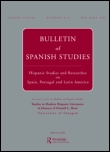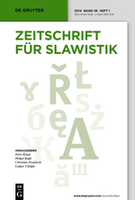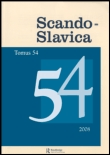
WELT DER SLAVEN-HALBJAHRESSCHRIFT FUR SLAVISTIK
Scope & Guideline
Unveiling New Perspectives in Slavistics
Introduction
Aims and Scopes
- Linguistic Studies:
The journal emphasizes comparative and contrastive linguistics, exploring grammatical structures, syntactic variability, and psycholinguistic aspects of Slavic languages. - Cultural and Literary Analysis:
It features in-depth analyses of Slavic literature, including historical contexts, thematic explorations, and the influence of cultural narratives on literary forms. - Historical Contextualization:
The journal integrates historical perspectives, examining the evolution of Slavic languages and literatures within broader socio-political contexts, including colonialism and nationalism. - Interdisciplinary Approaches:
There is a strong focus on interdisciplinary research, connecting linguistics, literature, history, and cultural studies, often incorporating cognitive and psychological perspectives. - Regional Studies:
The journal highlights regional studies within Slavic contexts, promoting research on specific geographical areas and their unique cultural and linguistic characteristics.
Trending and Emerging
- Cognitive Linguistics:
There is a growing interest in cognitive linguistics, particularly how language shapes thought and cultural understanding, as evidenced by studies focusing on the cognitive aspects of language use in Slavic contexts. - Interdisciplinary Cultural Studies:
Emerging themes emphasize the intersection of literature, history, and cultural studies, often exploring how literature reflects and shapes social movements and historical narratives. - Digital Humanities:
The integration of digital humanities methodologies is on the rise, with scholars utilizing digital tools for text analysis, linguistic mapping, and the visualization of cultural phenomena. - Environmental Literature:
There is an increasing focus on environmental themes within literature, particularly in the context of climate change and its representation in Slavic literary traditions. - Political Discourse Analysis:
Recent works are delving into the analysis of political discourse within Slavic contexts, particularly concerning contemporary issues such as nationalism, identity, and governance.
Declining or Waning
- Traditional Historical Linguistics:
Research focused solely on traditional historical linguistics has decreased, as scholars are increasingly integrating modern methodologies and interdisciplinary approaches. - Static Cultural Narratives:
Studies that rely on static interpretations of cultural narratives without considering contemporary implications or dynamics are becoming less common. - Narrow Philological Studies:
There is a noticeable decline in narrowly defined philological studies that do not engage with broader cultural or socio-political contexts, as the field moves towards more integrative research.
Similar Journals

Bulletin of Spanish Studies
Connecting Scholars through Spanish Literary ExplorationBulletin of Spanish Studies is a prominent academic journal dedicated to the exploration and discourse of Spanish studies within the diverse realms of Cultural Studies and Literature and Literary Theory. Published by Routledge Journals, Taylor & Francis Ltd, this journal serves as a crucial platform for scholars, researchers, and students to disseminate their findings and engage in scholarly debates related to Spanish literature, culture, and linguistics. With an emphasis on high-quality, peer-reviewed research, the journal holds a reputable Q3 ranking in Cultural Studies and a commendable Q2 ranking in Literature and Literary Theory, reflecting its significant impact within the academic community. The Bulletin is indexed in notable databases, achieving a rank of #314 out of 1106 in Literature and Literary Theory and #738 out of 1304 in Cultural Studies, signaling its vital role in advancing knowledge in these fields. Although it does not currently offer open access options, the journal remains an essential resource for those passionate about the study of Spanish culture and literature from 2010 to 2024 and beyond.

ZEITSCHRIFT FUR SLAWISTIK
Innovating Perspectives in Slavic Cultural StudiesZEITSCHRIFT FUR SLAWISTIK, published by WALTER DE GRUYTER GMBH, is a renowned journal focusing on Slavic studies, encompassing various fields such as cultural studies, linguistics, and literary theory. With its ISSN 0044-3506, this distinguished journal has been a significant contribution to the academic community since its inception in 1956, continuing to disseminate valuable research until 2024. While maintaining a strong reputation within several academic categories, ZEITSCHRIFT FUR SLAWISTIK holds a Q3 ranking in Cultural Studies and Linguistics and Language, and a Q2 ranking in Literature and Literary Theory as of 2023. This positioning underscores the journal’s impact, particularly as it caters to an audience of researchers, professionals, and students invested in the rich tapestry of Slavic culture and language. Access to this journal is not open; however, its comprehensive articles are crucial for anyone aiming to explore and deepen their understanding of Slavic linguistic and literary traditions. The journal's work is essential in fostering cross-disciplinary dialogue and advancing scholarship in these vital areas.

Studi Slavistici
Unveiling the Rich Tapestry of Slavic LiteratureStudi Slavistici is an esteemed academic journal published by FIRENZE UNIV PRESS, focusing on the rich and diverse fields of Cultural Studies, Linguistics and Language, and Literature and Literary Theory. Since its initiation in 2004, it operates under an Open Access model, providing unrestricted access to its contents and fostering a wider dissemination of research. Based in Italy, this journal serves as a vital platform for scholars and researchers engaged in Slavic studies and beyond, encouraging interdisciplinary dialogue and innovative approaches. With its current Quartile rankings in the Q4 category across various domains, it plays a significant role in shaping dialogues within the academic community while offering insights into contemporary and historical perspectives. By maintaining an inclusive vision and engaging with critical issues, Studi Slavistici remains dedicated to advancing knowledge and scholarship in these intricate fields.

Studia z Filologii Polskiej i Slowianskiej
Unraveling the Rich Tapestry of Slavic PhilologyStudia z Filologii Polskiej i Slowianskiej is a prominent journal published by the Polish Academy of Sciences, Institute of Slavic Studies, focusing on the rich and diverse field of linguistics and language studies, particularly within the Slavic context. With the ISSN 0081-7090 and E-ISSN 2392-2435, this open-access journal has been a valuable resource for researchers, professionals, and students since its transition to an open-access model in 2014. It features rigorous peer-reviewed articles that contribute to the understanding of linguistic phenomena and cultural narratives across Slavic languages. Recognized within the Q3 quartile of linguistics and language in 2023, it ranks at the intersection of arts, humanities, and social sciences, providing insights that echo through disciplines such as sociolinguistics, psycholinguistics, and philology. In its ongoing publication trajectory from 2011 to 2023, Studia z Filologii Polskiej i Slowianskiej continues to foster academic discourse and collaboration, positioning itself as a key player in the global linguistic community.

Zbornik Matice Srpske za Slavistiku-Matica Srpska Journal of Slavic Studies
Exploring the Depths of Slavic HeritageZbornik Matice Srpske za Slavistiku - Matica Srpska Journal of Slavic Studies, published by Matica Srpska in Serbia, is a prominent academic journal focusing on the diverse and rich field of Slavic studies. With an ISSN of 0352-5007 and a commitment to advancing knowledge in linguistics, literature, and cultural contexts, this journal serves as a vital resource for researchers, professionals, and students alike. Although designated as an open access journal, its significance is highlighted by its ranking in the lower quartiles of 2023 across various categories, including Q4 in Linguistics and Language and Q3 in Literature and Literary Theory. The journal's Scopus rankings further reflect its position, with a percentile of just 8th for Language and Linguistics. These factors underscore the journal's ongoing contribution to Slavic scholarship from 2019 to 2024, fostering dialogue and exploration in a field that remains crucial for understanding Eastern European cultures and languages.

Scando-Slavica
Fostering Dialogue Between Scandinavian and Slavic StudiesScando-Slavica is a renowned academic journal published by ROUTLEDGE JOURNALS, TAYLOR & FRANCIS LTD, specializing in the rich interplay of Scandinavian and Slavic studies. With its ISSN 0080-6765 and E-ISSN 1600-082X, the journal has been a critical resource for scholars since its inception in 1954, covering a wide range of disciplines including archaeology, cultural studies, history, linguistics, and literature. As of 2023, it has consistently ranked in the third quartile across various categories, indicating its influential role in disseminating innovative research within the arts and humanities. With a focus on interdisciplinary dialogue, Scando-Slavica aims to foster a deeper understanding of cultural exchanges and linguistic connections, making it an essential read for researchers, professionals, and students interested in exploring the complexities of Nordic and Slavic interactions. While currently not an open access journal, its contributions have garnered substantial citations, bolstering its academic impact and relevance in a diverse scholarly landscape.

ZEITSCHRIFT FUR SLAVISCHE PHILOLOGIE
Bridging Tradition and Innovation in Slavic StudiesZEITSCHRIFT FUR SLAVISCHE PHILOLOGIE is a pivotal journal in the field of Slavonic philology, published by Universitatsverlag C Winter Heidelberg GmbH. Renowned for its scholarly rigor and insightful contributions, this journal serves as a key platform for researchers, professionals, and students interested in Slavic languages and linguistics. Despite its classification as a traditional subscription journal, it has maintained a consistent presence in the academic community with contributions that enhance understanding of linguistic, cultural, and literary studies within the Slavic context. With an H-index reflecting its impact and relevance, the journal has historically been indexed in Scopus, ranking in the 34th and 33rd percentiles within the Arts and Humanities and Social Sciences categories, respectively. The journal has featured a range of scholarly articles from 2002 to 2017, providing a rich repository of knowledge for those dedicated to the study of Slavic languages. For any researcher aiming to delve into this dynamic field, ZEITSCHRIFT FUR SLAVISCHE PHILOLOGIE remains an essential resource.

Archivum
Nurturing the Scholarly Spirit of AsturiasArchivum, published by UNIV OVIEDO in Spain, stands as a vital resource in the fields of Linguistics and Language as well as Literature and Literary Theory. With an impact factor reflective of its commitment to scholarly excellence, this journal has proudly maintained an Open Access model since 1951, ensuring that its rich repository of knowledge is freely available to researchers, professionals, and students alike. Covering a converged span from 2019 to 2023, Archivum has strategically positioned itself within the academic milieu, currently categorized in the Q4 for Linguistics and Language and Q3 for Literature and Literary Theory as of 2023. The journal is indexed in Scopus, with rankings that reflect its growing influence, such as #690 in Literature and Literary Theory and #887 in Language and Linguistics. Despite its challenges in visibility, Archivum remains essential for those seeking to engage with contemporary discussions and research within the humanities. Located in the heart of Asturias, it embodies the scholarly spirit of Spain, fostering a collaborative environment for innovation and inquiry in linguistic and literary studies.

SLAVIC AND EAST EUROPEAN JOURNAL
Exploring the Depths of Slavic HeritageThe Slavic and East European Journal (ISSN: 0037-6752) is a distinguished publication focused on the rich tapestry of Slavic and Eastern European cultures, languages, and literatures. Published by the Ohio State University’s Department of Slavic and East European Languages & Culture, this journal serves as a vital platform for scholars and researchers keen on exploring linguistic diversity and cultural heritage in these regions. With a wide-ranging scope, the journal addresses significant topics within Cultural Studies, Linguistics, and Literature, currently categorized in Q4 and Q3 quartiles across various academic metrics. Although it does not offer open access, anticipation is high among academics seeking to contribute or access cutting-edge research that pushes the boundaries of understanding these complex fields. As it converges from 2009 to 2024, the Slavic and East European Journal continues to uphold its commitment to academic excellence and community engagement, making it an essential resource for anyone dedicated to the study of Slavic and Eastern European traditions.

Konstantinove Listy-Constantines Letters
Fostering scholarly discourse across diverse academic landscapes.Konstantinove Listy - Constantines Letters is a premier academic journal published by the Constantine Philosopher University in Nitra, Slovakia. With a focus on the interdisciplinary exploration of historical, philosophical, and religious studies, this journal has established itself as a significant platform for scholarly discourse since its inception in 2015. The journal's impressive rankings—Q1 in History and Religious Studies, along with Q2 in Philosophy—demonstrate its commitment to high-quality research, concurrent with its strong performance in Scopus rankings, placing it in the 80th percentile for both Religious Studies and History disciplines. As an integral part of the academic landscape, Konstantinove Listy invites researchers, professionals, and students alike to contribute to its mission of advancing knowledge and understanding in these vital fields. While the journal operates under traditional publishing, it is recognized for its accessibility and contribution to fostering a vibrant scholarly community.